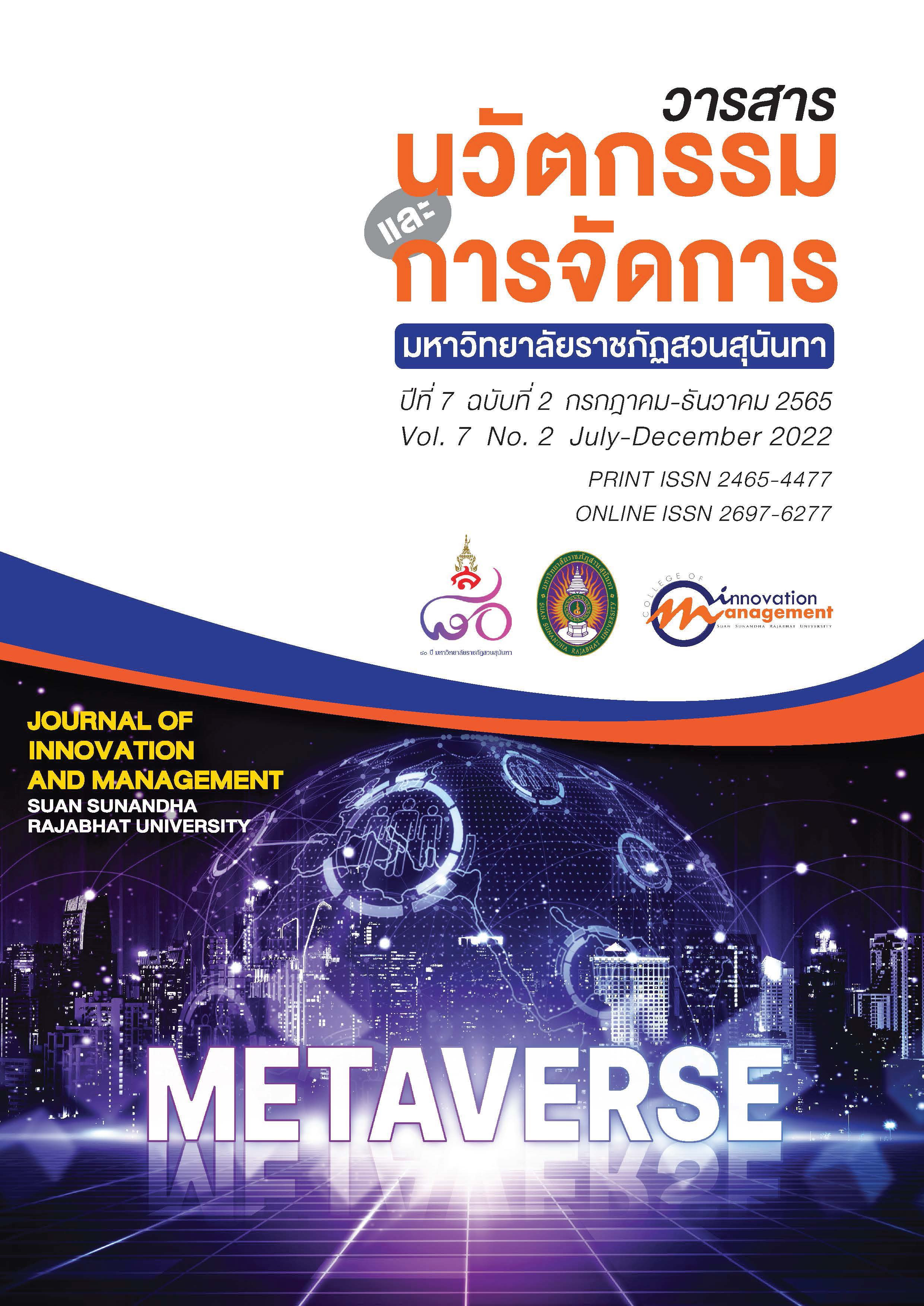Technology Management Model for Determining the Capacity of Tourists in Taling Chan Floating Market
Keywords:
The Ability to Accommodate Tourists, Taling Chan Floating Market, TouristsAbstract
A study of technology management model for determining the capacity to accommodate tourists in the Taling Chan floating market. The researcher conducted a survey and searched for relevant secondary data from documents, writings, textbooks, journals, research papers, and relevant Internet data to process, define, and bring data to analyze and synthesize potential with research objectives to explore and study the context of Taling Chan Floating Market. To determine the capacity to accommodate tourists to analyze the potential and capacity to accommodate tourists of Taling Chan Floating Market (Space and facilities) and to lay out a technology management model to determine the capacity to support tourists in the Taling Chan Floating Market. The context of Taling Chan Floating Market and its capacity to accommodate tourists It can be divided according to the floating market standard in 5 aspects, namely, the 1st aspect of the physical characteristics of tourist attractions, the 2nd aspect of tourism management and services, the 3rd aspect of society and arts and culture, the 4th aspect of environmental quality conservation, and the 5th aspect. Economy Taling Chan Floating Market is a famous water attraction in Bangkok. There is delicious food to serve tourists. There are both on land and in rafts. There are also a variety of products such as plants, flowers, fruits, savory foods, and souvenirs from the community for tourists to choose to buy. It is creating economic value for the country. Can generate income for local people and those whose careers are linked to tourism Each year, the number of tourists increases every year. By the technology management model for determining the secondary capacity to support tourists in the Taling Chan Floating Market, it was found that from the operation of the Taling Chan Floating Market. There is a clear, concrete self-management. In the work process, it has changed all the time from the past to the present, but in order to develop and improve the quality of life of the people of the Taling Chan Floating Market community. Both in terms of self-reliance and good management and rules for coexistence. In addition, the carrying capacity of tourist attractions is divided into 4 characteristics: (1) Physical carrying capacity (2) Environmental carrying capacity (3) Carrying capacity have social and (4) Capacities to support the economy.
References
Anuyahong, T. (2020). Participation of the people's sector in sanitation management of Taling Chan Floating Market. [Online]. Retrieved June 12, 2020 from: http://www.bangkok.go.th/upload/user/00000112/News/npt/2020/clean/thanapon.pdf
Dechphong. K. (2019). The riverside lifestyle of the people of Taling Chan Floating Market for sustainable tourism Taling Chan District, Bangkok. The Proceedings of the 2nd National Conference on Research Presentations of Students in Humanities and Social Sciences, January 19, 2019 at the Faculty of Humanities and Social Sciences, Suan Sunandha Rajabhat University. (in Thai)
Chakkaew, A. (2002). Geographic information system for tourism information foundation management. in Prachuap Khiri Khan Province. Thesis of the Degree of Master Program in Geography. Bangkok: Faculty of Arts, Chulalongkorn University.
Kaewuthai, K., Pornphanphaiboon, S., Kaewuthai, B. and Sarimat. (2018). Tick Capacity and satisfaction of tourists towards the facilities around Bang Pae Waterfall Phuket Province. The Proceedings of the National Conference Phuket Rajabhat University 11th time: 2018 “Integrating Wisdom to Innovation and Sustainable Local Development” Agricultural Resource Management for Tourism Faculty of Agricultural Technology Phuket Rajabhat University. Retrieved October 22, 2020, from: https://btech.pkru.ac.th/images/doc/ PKRU2561_benjaporn_bangpae.pdf
Ketanon, R. (2006). Proposing guidelines for sustainable tourism development in provinces. Samut Songkhram. Thesis of the Degree of Master Program. Bangkok, Faculty of Humanities, Srinakharinwirot University.
Kittichayanon, S. (2007). Establishing floating market standards for ecotourism: Case study of Taling Chan Floating Market. Thesis of the Degree of Master of Science Program in Planning and Tourism Management. Bangkok: Srinakharinwirot University.
Kongkaew, J. Pongsuwan, N., Buaphet, P. and Butrat, P. (2013). Capacity to support and management measures for shallow-water coral reef tourism on Khai Nok Island Phang Nga Province. Thesis of the Degree of Master of Science Program in Technology and Environment. Songkla, Prince of Songkla University. [Online]. Retrieved October 18, 2020 from: https://opac.kku.ac.th/ Catalog/ArticleItem.aspx?JMarcID= j00256055.
Laemuang, S. (2006). The impact of tourism in the Amphawa floating market on the way of life of Community. Thesis of the Degree of Master of Business Administration Program in General Business Management. Nakhon Pathom: Silpakorn University. (in Thai)
Leloem, P. (2005). Ecotourism. A case study of Taling Chan Floating Market. Thesis of the Degree of Master Program in Sociology. Bangkok: Faculty of Sociology and Anthropology, Thammasat University.
Paosuwan, K. et al. (2007). Research report on expectation and satisfaction With to study at Suan Dusit Rajabhat University, Phitsanulok Center. Bangkok: Research and Development Institute, Suan Dusit Rajabhat University.
Phochan, J. (2010). Work satisfaction of nursing college professors in the North. Thesis of the Degree of Master of Education Program in Educational Administration. Bangkok: Srinakharinwirot University Prasarnmit.
Rangyangkun, W. (2008). Human behavior and environment. 8th ed. Bangkok: Chulalongkorn University.
Rodruangdet, N. (2012). Feasibility Study for Taling Chan Floating Market Development. Independent Study of the Degree of Master of Business Administration. Bangkok: Thammasat University. (in Thai)
Sarasorn, N. (2010). The impact of tourism industry on the economic condition of the floating market. Convenient, Ratchaburi Province. Thesis of the Degree of Master Program in Anthropology. Bangkok: Silpakorn University.
Wattanavanich, K. (2007). Factors affecting the quality of ecotourism. Thai tourists: a case study of Taling Chan Floating Market, Taling Chan District, Bangkok. Thesis of the Degree of Master Program. Nakhon Pathom: Faculty of Social Sciences and Humanities, Mahidol University.
Wongsarot, R. (2018). Study of ways to increase support capacity and increase income of tourist attractions. International Thai Tourism Journal, 14(2), 62-75.
Downloads
Published
How to Cite
Issue
Section
License
Copyright (c) 2022 Journal of Innovation and Management

This work is licensed under a Creative Commons Attribution-NonCommercial-NoDerivatives 4.0 International License.
See Publication Ethics https://so03.tci-thaijo.org/index.php/journalcim/Ethics






